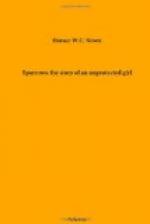“How very distressing!” remarked Victoria in her exquisitely modulated voice. “We should try and do something for her.”
“We will,” said her father.
“We certainly owe a duty to those who were once our neighbours,” assented Miss Spraggs.
“Do you remember her?” asked Mrs Devitt of her husband.
“Of course I do, now I come to think of it,” he replied.
“What was she like?”
He paused for a moment or two before replying.
“She’d reddy sort of hair and queer eyes. She was a fine little girl, but a fearful tomboy,” said Devitt.
“Pretty, then!” exclaimed Mrs Devitt, as she glanced apprehensively at her step-daughter.
“She was then. It was her hair that did it,” answered her husband.
“H’m!” came from his wife.
“The pretty child of to-day is the plain girl of to-morrow” commented Miss Spraggs.
“What was her real disposition?” asked Mrs Devitt.
“I know nothin’ about that; but she was always laughin’ when I saw her.”
“Frivolous!” commented Mrs Devitt.
“Perhaps there’s more about her in the letter,” suggested Lowther, who had been listening to all that had been said.
“There is,” said his step-mother; “but Miss Mee’s writing is very trying to the eyes.”
Montague took the schoolmistress’s letter from his wife’s hand. He read the following in his big, blustering voice:
“‘In all matters affectin’ Miss Keeves’s educational qualifications, I find her comme il faut, with the possible exception of freehand drawing, which is not all that a fastidious taste might desire. Her disposition is winnin’ and unaffected, but I think it my duty to mention that, on what might appear to others as slight provocation, Miss Keeves is apt to give way to sudden fits of passion, which, however, are of short duration. Doubtless, this is a fault of youth which years and experience will correct.’”
“Rebellious!” commented Mrs Devitt.
“Spirit!” said Harold, who all this while had been reclining in his invalid chair, apparently reading a review.
Mrs Devitt looked up, as if surprised.
“After all, everything depends on the point of view,” remarked Miss Spraggs.
“Is there any more?” asked Harold.
By way of reply, his father read from Miss Mee’s letter:
“’In conclusion, I am proud to admit that Miss Keeves has derived much benefit from so many years’ association with one who has endeavoured to influence her curriculum with the writin’s of the late Mr Ruskin, whose acquaintance it was the writer’s inestimable privilege to enjoy. With my best wishes for your welfare, I remain, dear Madam, your obedient servant, Annie Allpress Mee.’ That’s all,” he added, as he tossed the letter on to the table at his wife’s side.
“Did she know Ruskin?” asked Harold.
“When I was at her school—it was then at Fulham—she, or her sister, never let a day go by without making some reference to him,” replied his step-mother.




